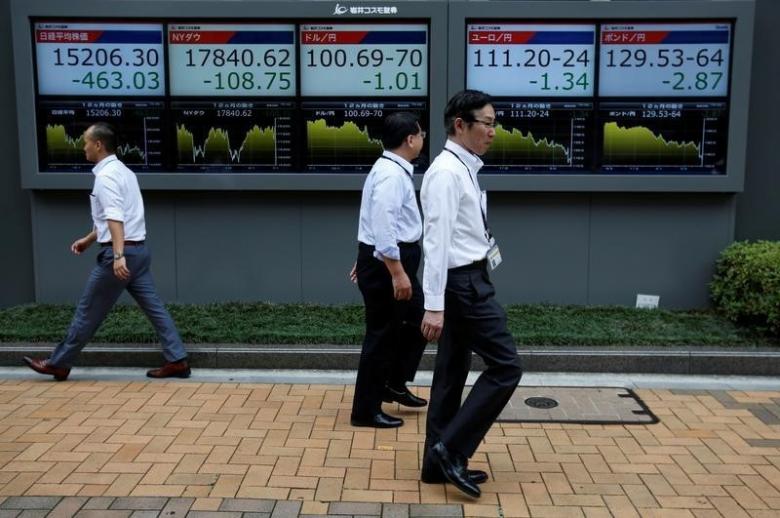Asian stocks fall to six-week lows as bond rout intensifies
Asian stocks fell to fresh six-week lows on Wednesday and the greenback stood strong against a broad swathe of currencies including the Japanese yen as concerns grew about the fading impact of the world's major central banks to stimulate growth.
Losses in stock markets across Asia deepened as rising bond yields and soaring volatility forced investors to unwind positions.
The MSCI's broadest index of Asia-Pacific shares outside Japan slid 0.2 percent, extending its decline since late last week to 4.2 percent.
Within the region, Japan's Nikkei led losers with a 0.3 percent decline as uncertainty grew ahead of a central bank policy meeting next week.
The BOJ plans to make its controversial negative interest rate policy the centerpiece of future monetary easing, promising to weigh further rate cuts as expansions to asset buying near their limits, the Nikkei newspaper reported on Wednesday.
"The moves in developed market fixed-income, which are largely behind the volatility, have stemmed from Japan and the potential changes in monetary policy," said Chris Weston, chief markets strategist at IG Markets.
"Secondly, some of the biggest systematic funds have had to alter their portfolios. The rest of the market participants have had to simply react."
Stock markets have come under pressure as investors cut positions after large inflows in recent weeks betting on a long period of low volatility and suppressed bond yields.
Inflows into emerging market equity funds amounted to $24 billion dollars over the past 10 weeks, the highest on record according to Bank of America Merrill Lynch flow data. An index of market volatility soared to its highest level in three months.
On Wall Street, S&P 500 Index lost 1.48 percent to 2,127.02, a two-month low. Although it has managed to hold above its 200-day moving average at 2,121, a break of that level could sap market confidence. Futures were flat.
BONDS ON THE ROPES
Bond yields extended their rise, suggesting more losses for equity markets with yields on 30-year Japanese debt hitting the highest levels in six months, unnerving investors.
The 10-year US Treasuries yield rose to a three-month high of 1.75 percent, having risen more than 20 basis points from a week ago.
The rise in US bond yields came even as expectations on the Federal Reserve's monetary policy outlook hardly changed. US interest rate futures <0#FF:> are pricing in only about a 10 percent chance of a rate hike at next week's policy review.
While the rise in US bond yields was in part due to heavy Treasury and corporate debt supply, it also reflected concerns about the limits of global central bank policy in reviving growth.
Bond markets have come under pressure in recent days from unease about a possible US rate hike this month, news that the Bank of Japan is studying ways to steepen the bond yield curve and disappointment at the lack of clear forward-action plan by the European Central Bank at last week's meeting.
Jeffrey Gundlach, chief executive officer of DoubleLine Capital, said on Tuesday that long-term decline in global bond yields is over and investors are watching out for a likely fiscal expansion in the world's major economies where monetary stimulus has reached its limits.
The prospects of a US rate hike by the year-end helped to underpin the dollar against other currencies.
The euro dipped to $1.12200, a slight decline on the day and the week while the dollar also gained to 102.99 yen from Tuesday's low of 101.42 yen.
The yen was also dented by the Nikkei newspaper report on the BOJ and negative rates.
Short-dated Japanese bond yields fell, with the five-year JGB yield slipping 2.5 basis points to minus 0.200 percent while the two-year yield fell 2.0 basis point to hit a six-week low of minus 0.265 percent.
Crude oil prices edged up after a 3 percent tumble in the previous session. Brent futures rose 15 cents to $47.25 a barrel, while US light crude rose 20 cents to $45.10 as data from an industry group showed a smaller-than-expected build in US crude stocks.






